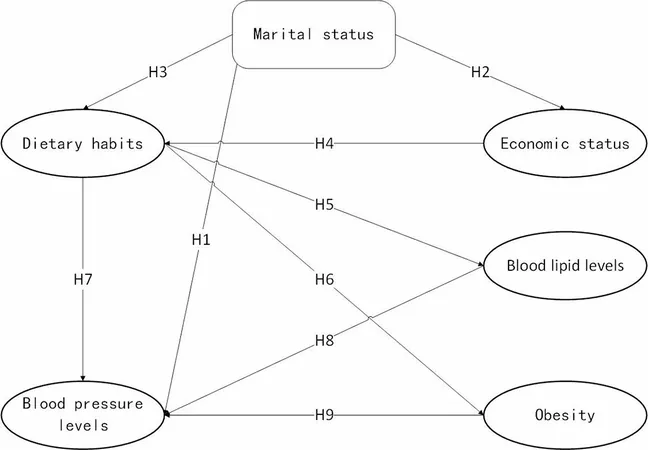
Are Your Relationship Struggles Raising Your Blood Pressure? Discover the Surprising Link!
2025-08-30
Author: Jia
Understanding Hypertension and Its Complexities
Hypertension, or high blood pressure, is a chronic condition that has many causes. A recent study has explored the lesser-known factor of marital status in relation to blood pressure levels, revealing some startling insights.
The Study: Unveiling the Connections
In a detailed examination involving 1,852 participants from Baoding in the Beijing-Tianjin-Hebei region, researchers utilized Structural Equation Modeling (SEM) to analyze how marital status impacts blood pressure. Participants were grouped by gender and relationship status, comparing those in stable marriages against those experiencing marital turmoil such as divorce or widowhood.
Stunning Results for Women
Findings indicated a concerning trend: women facing marital challenges had significantly higher systolic blood pressure compared to their married counterparts. In fact, they displayed distinctive pathways influencing this jump in blood pressure: through economic status and dietary habits. The analysis found that marital status indirectly affected women’s blood pressure through their economic conditions and eating behaviors.
Why Does Marital Status Matter?
The results highlighted an essential truth—stable marriages often lead to healthier lifestyles and protections against health issues. However, for those in unstable relationships, increased psychological stress and decreased financial stability can contribute to heightened health risks.
The Bigger Picture: Gender Differences
Interestingly, the same direct association was not observed among men. The study discovered that marital status did not significantly impact blood pressure levels for men. This discrepancy raises questions about how societal expectations and economic pressures differ for genders in marital dynamics.
Practical Implications for Health Strategies
These findings emphasize the importance of tailored health interventions, especially for women grappling with marital difficulties. Healthcare providers should consider offering psychological support and health education aimed at mitigating hypertension risks for individuals in troubled relationships.
Conclusion: The Urgency of Further Research
As hypertension poses a global health threat—affecting over 1.39 billion adults—it’s crucial for future studies to investigate the intricate ties between marital status and health. Understanding these dynamics can pave the way for effective preventive strategies that are sensitive to the unique challenges faced by different demographics.
Stay Informed, Stay Healthy!
As research unveils new layers of complexity surrounding health and relationships, staying aware of these connections can empower individuals to take control of their well-being. Whether examining your relationship dynamics or impacting your health habits, remember—your marital status may play a more significant role than you think!

 Brasil (PT)
Brasil (PT)
 Canada (EN)
Canada (EN)
 Chile (ES)
Chile (ES)
 Česko (CS)
Česko (CS)
 대한민국 (KO)
대한민국 (KO)
 España (ES)
España (ES)
 France (FR)
France (FR)
 Hong Kong (EN)
Hong Kong (EN)
 Italia (IT)
Italia (IT)
 日本 (JA)
日本 (JA)
 Magyarország (HU)
Magyarország (HU)
 Norge (NO)
Norge (NO)
 Polska (PL)
Polska (PL)
 Schweiz (DE)
Schweiz (DE)
 Singapore (EN)
Singapore (EN)
 Sverige (SV)
Sverige (SV)
 Suomi (FI)
Suomi (FI)
 Türkiye (TR)
Türkiye (TR)
 الإمارات العربية المتحدة (AR)
الإمارات العربية المتحدة (AR)